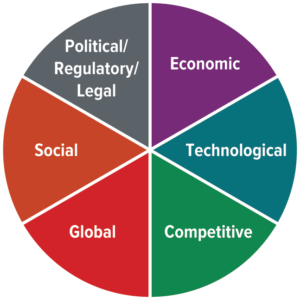Classify examples of the impacts of economic, political/legal/regulatory, technological, competitive, global, and social factors on businesses.
Business and entrepreneurship don’t exist in a vacuum. All companies operate within the business environment, the arena of factors that encourage or discourage business development. These factors can be divided into six categories:

Economic Factors: The Tension Between Freedom and Restraint
Business owners face continual tension between the freedoms to operate a business and the regulations provided by governments. Several common areas include:
Taxation: Some countries have higher tax rates on businesses, which can restrict how much companies can invest in initiatives and how much profit is retained in the business.
Contract enforcement: In countries that do not strongly enforce contract laws, businesspeople are reluctant to enter into business relationships.
Corruption: Countries that don’t punish corruption and bribery create an atmosphere of uncertainty that can hurt honest businesspeople.
Technological Factors: The Effect on Productivity and Security
Technology includes not only digital technology (computers, telecommunications, and giant data storage) but also all machines required to help a company get things done, including delivery vans, vending machines, and surveillance cameras.
Technology has given rise to e-commerce, or electronic commerce, the buying, and selling of products or services over computer networks. E-commerce is reshaping entire industries and revamping the very notion of what a company is.
Information technology has also facilitated e-business, using the Internet to facilitate every aspect of running a business. Some impacts include:
Productivity: The purpose of all technology is to improve productivity, defined as the amount of output given the amount of input—such as the number of doughnuts produced by one worker in an hour.
Security: Technological systems can enhance productivity, but they can also compromise security—for example, by allowing hackers to steal credit card information.
Competitive Factors: The Influence on Customers, Employees, and Investor Satisfaction
Competitors are people or organizations that are rivals for a company’s customers or resources. The rivalry that exists between businesses in certain industries can be extremely difficult for a business to operate within, causing some businesses to fail. Because all businesses must deal with competition, businesses strive to create a competitive advantage to allow the organization to create products, systems, or cultures that are not easily replicable.
Customers: A company such as a public utility that is the only one in its industry has no particular incentive to improve service with its customers because it knows they have nowhere else to go.
Employees: A technology company trying to recruit and keep top talent will go to greater lengths if it knows there are other companies fiercely competing for that talent.
Investors: A bank that is the only one in a state or country may pay its investors whatever it wants.
Social Factors: The Impact of Demographics
Changes in a country’s demographics, the population’s measurable characteristics such as gender, age, race, and family composition, can change a business’s number of customers. Customers’ changing needs and tastes can also affect the business.
Global Factors: The Effect on Trade and Stability
Businesses today operate in a global economy, one in which customers can be located a mile away or halfway around the globe. Globalization refers to the movement of the world economy toward becoming a more interdependent system.
Global forces include all of the following:
- Trade pacts and economic unions: Formal trade agreements can facilitate the exchange of goods and services between nations, which in turn can affect a nation’s manufacturing capacity, employment level, and travel policies.
- Military alliances
- Currency exchanges
- Immigration policies
- Environmental regulations
All of these forces can affect national stability. Wars, terrorism, recessions, currency panics, epidemics, refugee flows, and ecological changes can undermine national stability—thereby increasing risk to business owners.
Political/Regulatory/Legal: The Rules Business Must Abide By
Both nationally and internationally, regulations, laws, and politics set the rules businesses must abide by to stay in business and out of trouble.
For example, new laws and regulations were implemented after the recession to protect consumers from predatory lending practices.